
foreword | Historical Narratives | Resources | Links | Contact
FATHERS OF CONFEDERATION
History is the aspirations of humanity.
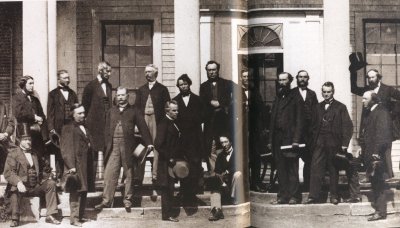 |
|
Fathers of Confederation |
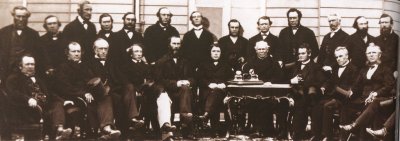 |
|
Fathers of Confederation - Quebec Conference |
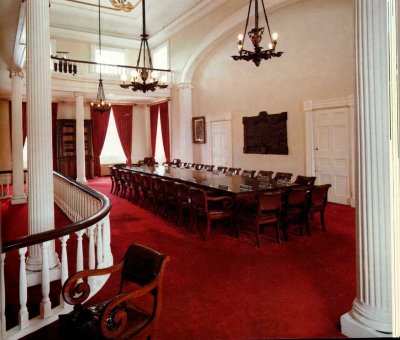 |
|
Confederation Chamber |
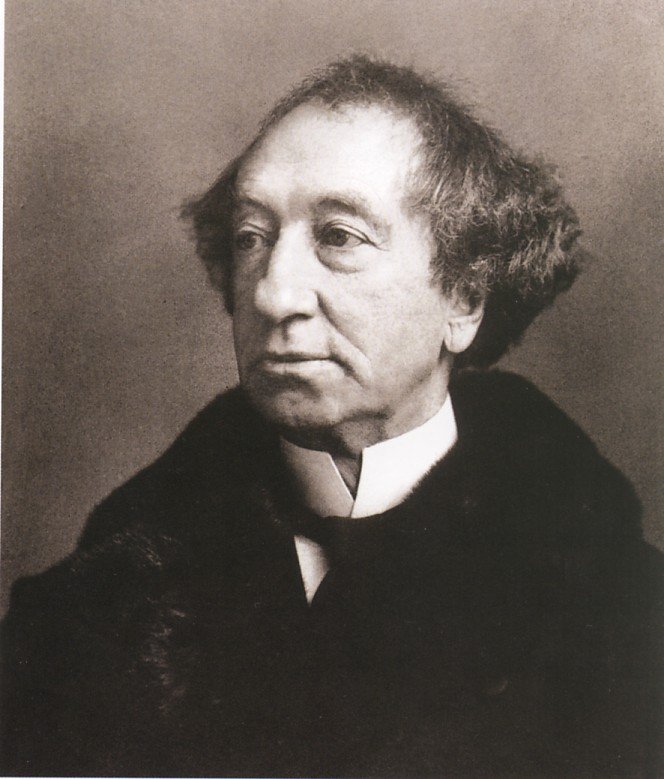 |
|
Sir John A. Macdonald |
Sir John A Macdonald (1815-1891) was born in Scotland and with his parents emigrated to Kingston, Upper Canada Canada in 1820 when he was five years old. He was an apt pupil, a bright student who liked school, did well and was told he had a promising future. He was intelligent, sensible and had a retentive memory. On leaving school he became a fifteen-year-old law student. His legal career was generally successful. As a courtroom lawyer he was noted for quickness of mind, for ingenuity in defence and a talent for persuasiveness. As the only son, he became the family's head at the age of twenty-six when his father died.
His first wife, Isabella and he had two sons: John Alexander who died in infancy and Hugh John. Sir Hugh John Macdonald was born on March 13, 1850 and was the only surviving son of the first Prime Minister of Canada, Sir John A. Macdonald. He was a politician in his own right, serving as a member of the Canadian House of Commons and a federal cabinet minister, and briefly as Premier of Manitoba. Macdonald was elected to the House of Commons in 1891, representing Winnipeg City for the Conservative Party. He was sworn into parliament at the side of his father, to the applause of members from both sides of the House.. After John A. died later that year, Hugh John showed little enthusiasm for life in Ottawa, resigned his seat in 1893 and returned to Winnipeg. He suffered from a protracted illness and died on March 29, 1929. After fourteen years of marriage, Isabella died. John remarried Agnes Bernard shortly before becoming Prime Minister.They had one daughter, Margaret Mary. Agnes survived John by 29 years and died in 1920.
John A's political career began when he was elected alderman of the city council. Having achieved local prominence as lawyer, business man and politician, he was seen as an obvious contender for the Kingston seat in the Legislative Assembly. He was an intelligent man with a cheerful, easy-going, optimistic disposition, a man of "intellect and general versatility."
Macdonald's style as a politician attracted widespread attention. From an early date he was one of the acknowledged leaders of his party and held various cabinet posts. In 1856 his fellow Upper Canadian conservatives chose him to be the head, and with Tache, the leader of the Reformers in Canada East, they formed the Tache-Macdonald administration. When Tache resigned in 1857 Macdonald formed the administration with George Etienne Cartier. Macdonald had a gift of potent charm "The old humbug" had any amount of small talk and his ability to amuse and persuade kept "the refractory members" in good humour and in line. Convinced that the country could be torn apart by political extremists, he succeeded in combining the moderate elements of both the Reformers and the Tories into one party - the Liberal-Conservatives.
Macdonald worked hard at politics and wanted any administration of which he was a leading member to be known as "a working government." He made the greatest demands on himself. When the attempt to govern Canada East and Canada West as united provinces was gradually breaking down, he cast about for a solution and jumped at the chance to join George Brown who was pressing for confederation of the British North America colonies. Macdonald's skill, patience and tact came into play when he steered the Confederation resolutions through the Legislature.
During the next three years of negotiations with opposing members of his party and with hesitating sister provinces and the mother country, Macdonald "displayed a skill that by comparison dwarfted the efforts of any of his colleagues." At Charlottetown John A. Macdonald and George-Etienne Cartier set out the arguments in favour of Confederation and the general terms of the Canadian proposal. Macdonald spoke first. He proposed the federal union earnestly and openly as the one salvation for Canada and the best hope of the Maritimes. Apart they were nothing; together they would be strong.
Within four days the Canadians presented such a convincing case the Maritime delegates abandoned their talks of Maritime union and before the conference adjourned on Sept. 7 the delegates agreed to meet again on Oct. 10 at Quebec City to work out final details of British North American federation. The breathless hope must be hammered into fact.
A lawyer, business man, shrewd politician, the pragmatic visionary Macdonald drafted many of the resolutions presented to the Quebec Conference. At the Westminster conference in London in December 1866 the Quebec Resolutions were the basis for the new constitution. A British official wrote: "Macdonald was the ruling genius and spokesman and I was greatly struck with his powers of management and adroitness."
In 1867 John A. Macdonald became the first prime minister of the new Dominion of Canda. As prime minister from 1867-73 and again from 1878-91 he accomplished Canada's expansion to the Pacific and the building of the transcontinental railway.
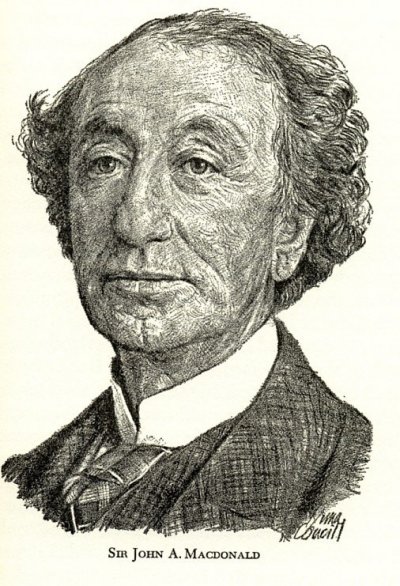 |
|
Sir John A. Macdonald, |
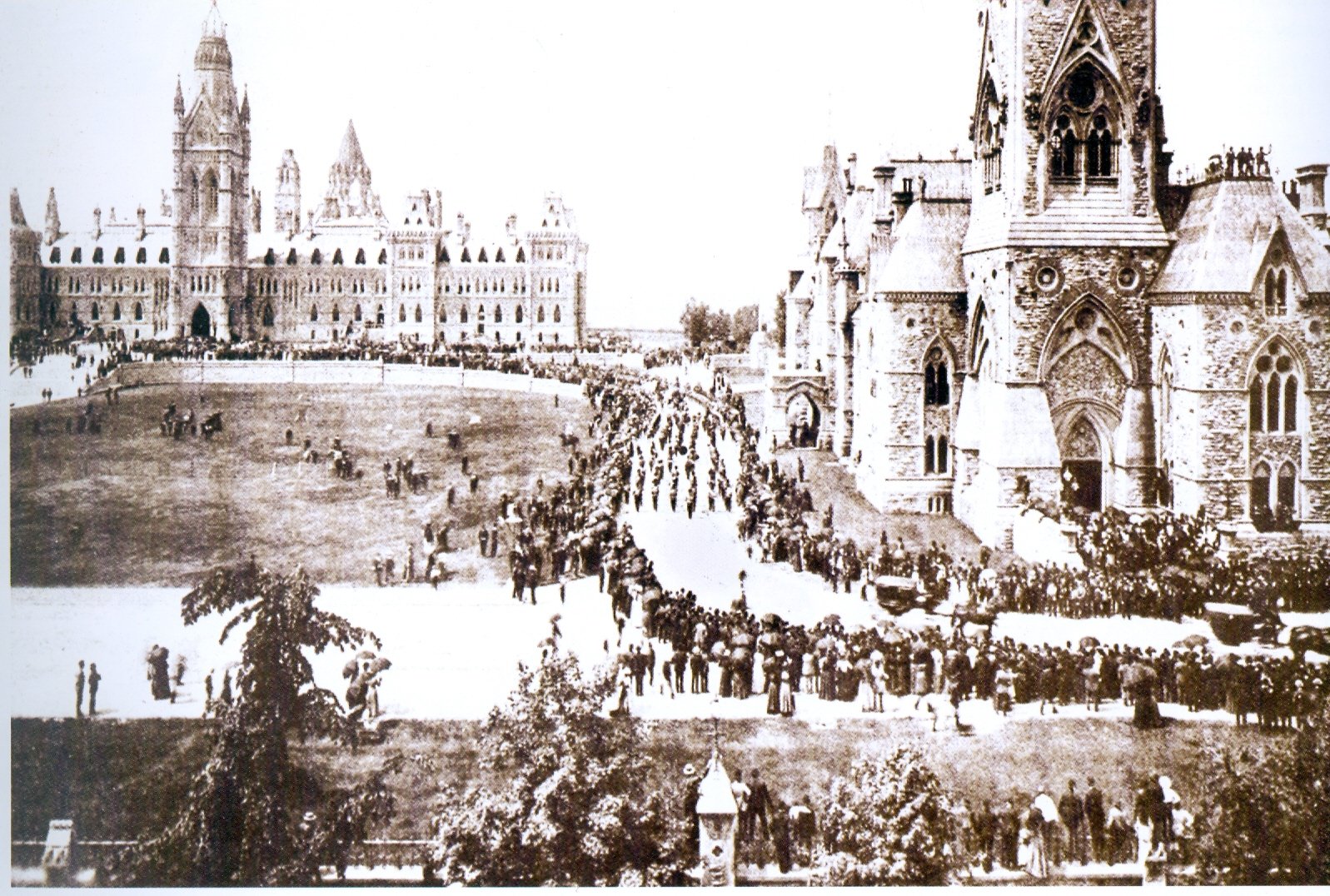 |
|
Photograph of Day Sir John A.Macdonald Left Parliament for the Last Time |
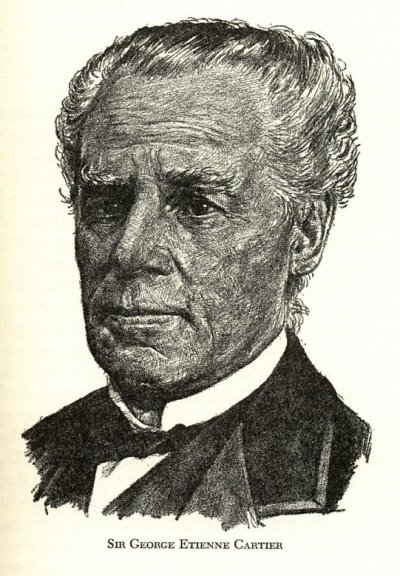 |
|
George Etienne Cartier |
George Etienne Cartier, a linear descendant of Jacques Cartier, was the leader of the French in Canada East. He was short, bristling and prematurely grey and alive with reckless vitality. His high, thin voice was often raised in song but oftener still in what was described as jangling speech. An English opponent once said his speech had the sound of someone "shaking a bag of nails." He had been 'Cartier the rebel' during the Rebellion of Lower Canada and with a price on his head he had fled for the border. Pardoned by the English Cartier came home and was elected to the legislature when Canada East and Canada West joined to form the union of Canada. While ever on guard to defend the rights of the French-speaking Canadians, he had no intention of "standing behind the crumbling walls of the past." He also had dreams for his country for he had helped to build it.
At Charlottetown following Macdonald, Cartier spoke. The French no less than the English wished to be part of a nation. They wished for a door on the sea, a way to the west, a shared greatness. They wished for a life to be lived by all in common. They were prepared to build, to sacrifice, to take enormous risks while always remaining themselves. "If the plan (Confederation) seems to us to safeguard Lower Canada's special interests, its religion and its nationality, we'll give it our support; if not we'll fight it with all our strength."
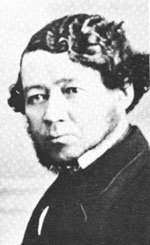 |
|
Thomas D'Arcy McGee |
The Life - and Tragic Death - of Canada's Most Colourful Father
McGee's life was from the start a combination of dramatic changes and close calls.
At the age of thirty-two McGee moved his family and himself to Montreal. That same fall the Irish vote elected him to Canada's legislature. Somewhere along the line he had fallen in love with his adopted country. Whatever he clasped he embraced with a consuming affection and he became converted to Confederation.
In the Legislative Assembly of Canada on February 9, 1865 McGee reminded those French Canadians opposed to the new federation of the following. "I will remind them that every one of the colonies we now propose to re-unite under one rule - in which that shall have a potential vote - were once before united as New France. Newfoundland the uttermost, was theirs; Cape Breton was their tills the final fall of Louisbourg; Prince Edward Island was their island of St. Jean and Charlottetown was their Port la Joie; in the heart of Nova Scotia was the fair Acadian land. In New Brunswick there is more than one county, especially in the north where business and law and politics require a knowledge of both English and French. Well gentlemen of French origin, we propose to restore these long-lost compatriots to your protection in the federal union which will recognize equally both languages."
Best known of all to the Maritime hosts was the little, elfin Irishman, Thomas D'Arcy McGee, "the most gifted orator ever to sit in Canada's Parliament". McGee, the gifted poet-politician spoke in terms of the need for a national vision. "I see in the not remote distance one great nationality bound like the shield of Achilles, by the blue rim of ocean ... I see within the ground of that shield the peaks of the western mountains and the crests of the eastern waves." He and his hundred friends had pleaded and preached and joked for a year before the cause of union. He would discover now if the seed had taken root.
McGee, an Irishman did not support the Fenian movement at a time when most Irishmen did. The movement's members thought he had "gone over" to the British cause which opposed their ultimate aim: the independence for Ireland. In fact, McGee was an ardent supporter of Irish nationalism, but he opposed the movement on two grounds. First, he objected to republican programme for Ireland and urged the Irish to adopt the Canadian model of self-government within the British Empire. Second, he opposed the call to violence advocated by the Fenians. McGee attacked the Fenian plan to invade British America and called on the Irish in Canada to "give the highest practical proof possible that an Irishman well governed becomes one of the best subjects of the law and the Sovereign." On a trip to Ireland, McGee gave a speech in which he described his behaviour during his earlier years when he "was an Irish rebel" as "the follies of one and twenty." To the fanatical Fenians McGee was accused of being a turncoat and a traitor to the Irish cause.
By 1866 McGee's political star was fading. He did not attend the London conference leading to confederation, but was elected to the country's first House of Commons in 1867 by a slim majority. He was not, however, included in Macdonald's first post-Confederation Cabinet. By 1868 McGee was planning to leave politics to spend more time on his writing and poetry. John A. Macdonald promised him a civil service post but McGee was dead before the appointment was made.
On April 7, 1868 McGee attended a late-night session in the House of Commons where he gave a speech in favour of national unity which was impassioned and showed much of his fiery forcefulness. Returning to his rooming house on Spark Street in the early hours of the morning he took out his key and put it into the latch keyhole to let himself in. At that instant there was a sudden flash and a sharp blast of a shot right behind him. He stumbled to his right, shuddered, threw his head back high and fell on his back as blood streamed onto the road from his upturned head. Several people came running to the scene. Learning of the assassination, John A. MacDonald raced to Mrs. Trotter's rooming house where he found McGee still lying in the road. He cradled his head while a friend lifted McGee's feet and together they carried him into the house. When he returned to his home, Macdonald, his face a ghastly white, turned to his wife, Agnes, and said, "McGee was murdered 'tis true" She had never seen her husband so distraught.
There was no sign of an assassin, no sign of a weapon. Nothing but the victim. McGee's assassin was Patrick James Whelan. He was caught and executed in what was the last public hanging in Canada. It is generally believed that McGee was the victim of a Fenian plot, however, Whelan was never proven to be a Fenian by the Crown prosecutor.
"Reasons for Confederation are as thick as blackberries."
D"Arcy McGee
"If we are a generation worthy to organize a nation, assuredly the materials are abundant and are at hand."
D'Arcy McGee
"The euphonious word, Canada, has three vowels, not an unpleasant incident for tongue or pen. It is as old and quite as historical as the name America. Like the ice-shove in the St. Lawrence before the magic breath of spring, so will cold sectional antagonism dissolve and disappear in the genial current of our great new State generously administered."
D'Arcy McGee
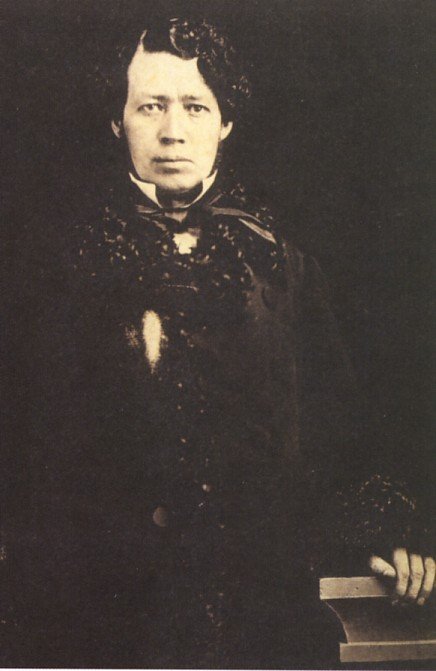 |
|
Thomas D'Arcy McGee |
McGee was given a state funeral a week later on his 43rd birthday. He was well liked and his funeral in his hometown of Montreal was a massive affair that reflected the new nation's shock at losing one of its founding fathers so soon.
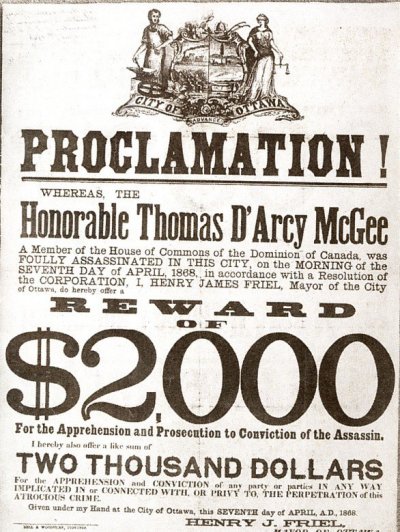 |
|
Reward for Apprehension of the Assassin of Thomas D'Arcy McGee |
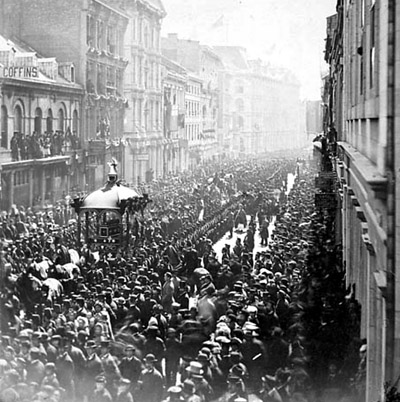 |
|
State Funeral of Thomas D'Arcy McGee |
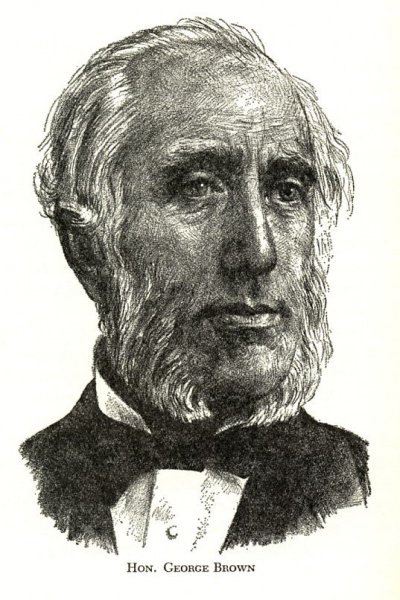 |
|
George Brown |
George Brown was the formiddable editor of Toronto Globe. Born in Scotland Brown, a man in his middle twenties, came to Canada in 1843. He grew rich as the owner of the Globe which became the voice of the province. He was one of the founders of the anti-slavery movement in Ontario. He used his newspaper, The Globe, to attack the institution of slavery in the Southern US states. The Canadian Anti-Slavery Society, which was formed in Upper Canada in 1837, raised money for refugee relief. Brown dreamed of the westward march of a mighty people and looked to a larger union than Canada West and Canada East to achieve his vision. Brown and Macdonald were bitter enemies, but in 1864 when a deadlock developed in the Assembly which prevented any legislative action, the two men agreed to join forces and form what became known as the Great Coalition. Joined by George Etienne Cartier and Alexander Galt, the coalition set out to achieve Confederation.
George Brown handled constitutional concerns.
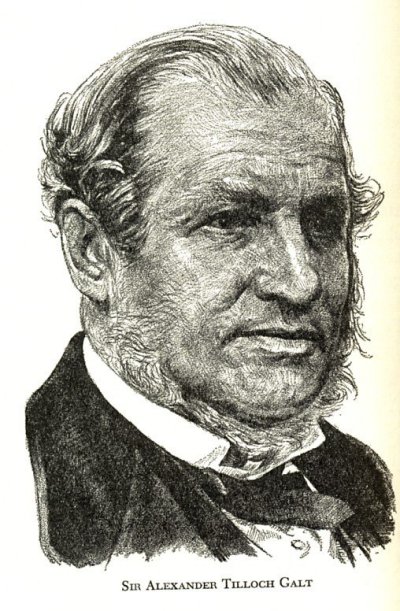 |
|
Sir Alexander Tilloch Galt |
Sir Alexander Tilloch Galt was born in England and came to Sherbrooke Quebec in 1835. He entered politics in 1853 representing Sherbrooke and was re-elected continually until 1867. He became Minister of Finance in the union government of the Canadas. Portly, handsome and rich, a landowner and railway builder whose dreams transcended money. They transcended the quarrels of race, religion and tongue. These divided Canada. What joined them? There was common allegiance to the British Crown. There was common hope of prospering on a mighty continent. Galt had proposed a solution seven years before - a new federal union in which each province would be sovereign in its separate concerns yet commit its common concerns in a central government. Here was a plan that would promise them all freedom, diversity and a common will - partners in freedom and in purpose. The plan was older than Galt but he had given it life. It was slowly taking a grip on the minds of men. The tide of the times was stronger than them all.
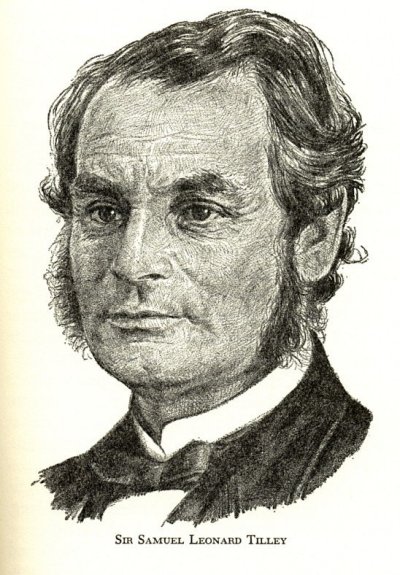 |
|
Samuel Leonard Tilley |
Born in Gagetown New Brunswick of United Empire Loyalist stock, Tilley entered politics and 1854 became provincial secretary in New Brunswick's first responsible cabinet. The office included the Finance portfolio. From 1861 he was also premier. In 1865 he called an election in which the primary issue was Confederation. The anti-confederation forces defeated him, but that party had no positive policies and soon began to flounder. The British governemt was anxious for Confederation to succeed and instructed the governor to "further the cause of union by every means in his power." Because the anti-confederation party was in extreme difficulty the governor called a new election. Tilley's argument for union received a boost when Fenians raided various points on the New Brunswick border and his party swept back into office. His character and tenacity of purpose contributed greatly to convince the wavering province to commit itself finally to Confederation. Tilley attended both the Charlottetown and Quebec conferences.
He was also present at the Westminster conference whch resulted in the British North America Act. Canada was designated a 'dominion' as a result of Tilley, the New Brunswick premier. Most of the Fathers of Confederation wanted to call their new creation the Kingdom of Canada. The British government, always sensitive to the possibility of offending the Americans, insisted on a different title. The religious Tilley turned to the Bible and found Psalm 72:8 - "He shall have dominion also from sea to sea." The new country became the Dominion of Canada. Tilley served in Macdonald's federal cabinet as minister of finance. He was described as statesman of ability, a gentleman in the best sense of the term.
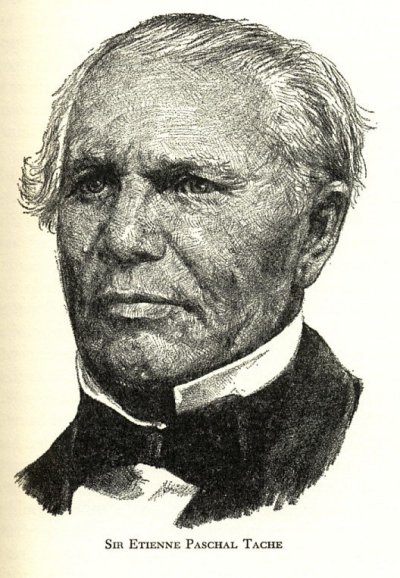 |
|
Sir Etienne-Paschal Tache |
Tache declared his dedication to Confederation and to Canada's membership in the British Empire with the famous utterance, "The last cannon which is shot on this continent in defence of Great Britain will be fired by the hand of a French Canadian." Tache fought for Britain and his homeland in the War of 1812 then became a leader in his medical profession and a leading Patriote. He sympathized with the rebels of 1837 but did not take up arms. He was an MPP (Member of the Provincial Parliament) and a legislative councillor 1848-65. He was co-premier with Macdonald (1855-57) and joined the Great Coalition in 1864 to pursue federal union and Confederation.
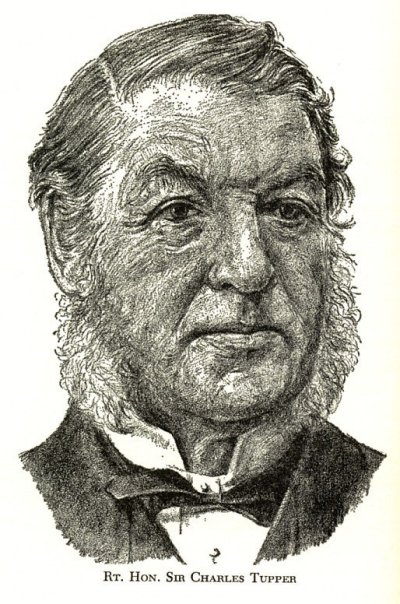 |
|
Sir Charles Tupper |
Charles Tupper was born in Amherst, Nova Scotia. After graduating with an M.D., Tupper rode the roads day and night ministering to the medical needs of Nova Scotia. In 1855 he entered politics and in 1864 became Premier of Nova Scotia at the age of forty-three. The brash, blunt bulldog of a man had fought his way to power. He favoured a union of all the British in North America but faced strong opposition to the concept of Confederation. However, when Tilley, an avid advocate of confederation, was swept back into office in New Brunswick, Tupper took heart and issued a call to arms. He warned, "If we remain disunited, the time may come when we shall have the British flag lowered beneath the Stars and Stripes and the last gun will be fired from the Citadel as a British fort." Joseph Howe, a powerful politician in Nova Scotia, opposed confederation, fearing it would separate the colonies from Great Britain. He chose, he said, "London under the domination of John Bull, rather than Ottawa under the domination of Jack Frost." The Legislature listened to Charles Tupper and acted, authorizing Tupper and other delegates to attend the conference in London to discuss Confederation. Tupper was Prime Minister of Canada for ten weeks in 1896. "No braver man ever led a party into battle and no more gallant fight was ever made to save a field than his in 1896." Later the government was defeated, but it was no fault of Tupper's.
Westminster Conference
The last of the confederation conferences took place on December 4, 1866 in London's Westminster Palace Hotel. It was so grand, it had an elevator. On Tuesday morning, December 4, 1866 six delegates of the Canadas sat down in London with five men from New Brunswick and the five from Nova Scotia. There were sixteen in London where there had been twenty-three in Charlottetown and thirty-three in Quebec. Fewer were required because many details had been reached and it remained now to give shape to the great decision. It was two years and three months since that September morning at Charlottetown. Much had changed in the interval. Prince Edward Island and Newfoundland had been lost. No longer visionaries they had now entered the stream of history of nation-building.
The fundamentals of Confederation: Continued loyalty to the British Crown through membership in the British Empire; a strong central government within a federal union with representation in the lower house based on population and in the upper house based on regional representation. The provinces retained control over their own local affairs. A lawyer, business man, shrewd politician, the pragmatic visionary Macdonald drafted many of the resolutions presented to the Quebec Conference. which were various changes, the basis for the new constitution. A British official wrote: "Macdonald was the ruling genius and spokesman and I was greatly struck with his powers of management and adroitness."
Macdonald had intended that the new nation be called the Kingdom of Canada, but just before the final versiion - there were seven drafts in all - the new nation became the Dominion of Canada. The change was made by the British prime minister who feared that the Americans would be offended for they had no love for monachies. Debate began on the bill ntroduced into the HOuse of Lords on February 19, 1867. Lord Carnarvan began the debate by stating, " We are laying the foundation of a great State, perhaps one that at a future day may even overshadown this country." One February 26, it was introduced into the House of Commons and the British North America Act was approved without change on March 8. On March 29 it received Royal Assent and was signed by Queen Victoria. Canada emerged into the world as a confederation.
John A. and Agnes arrived back in Ottawa, the country's new capital, in May 1867. The Parliament Buildings situated on Parliament Hill had just been completed. Their final cost had risen from the projected $688,505 to $4.5 million. The date for the Confederation celebrations was to be July 1. As that date approached, disturnbing news came from south of the border. The United States had purchased Alaska from Russia, whose Panhandle cut off much of northern British Columbia's access to the sea. American politicians then looked hungrily at what was left of the separate colony. They declared that nature designed the whole continent to be theirs. Macdonald feared BC would soon be annexed by the Yanks. Macdonld saw only one remedy: confederation itself.
July 1st was celebrated in Toronto with the roasting on Church Street of an immense ox purchased by public subscription. In this city and elsewhere across the land, fireworks, bonfires, parades and pride predominated. Let joy be unconfined; no sleep till morn when excited citizens happily heralded the existence of their new country - CANADA!
Despite the fear ofIn 1867 Sir John A. Macdonald became the first prime minister of the new Dominion of Canada. As prime minister from 1867-73 and again from 1878-91, John A oversaw the building of our transcontinental railway. Canada would expand from sea to sea to sea.
Copyright © 2013 Website Administrator